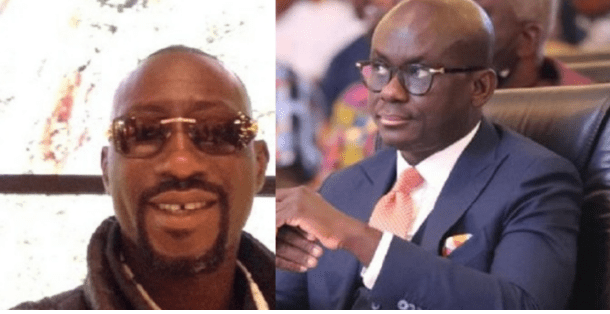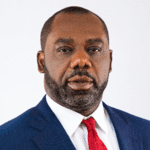By M B YEBOAH
A person charged with an offence may bring an application that the charge be quashed on the ground that it is defective for one reason or the other, or that the proof of evidence does not disclose a prima facie case against him sufficient to warrant calling upon him to provide some explanation or even undergo the rigour of a full trial.
See Chief Lere Adebayo v. The State (2012) LPELR-9494(CA) per Kekere-Ekun, JCA (as he then was).
On the 30th day of May 2024, counsel for the 3rd accused person in the person of the highly revered Thaddeus Sory applied to have “the charges against his client terminated or in the alternative stayed”.
In arguing his grounds, the highly esteemed counsel based his arguments on three grounds namely;
I. That the learned Attorney-General has abused his constitutional power to prosecute the accused person,
II. The trial is tantamount to an abuse of process and
III. That the trial stifles the right of the accused person to have a fair trial.
I proceed to examine the strength or otherwise of each of the three grounds stated supra;
That the learned Attorney-General has abused his constitutional power to prosecute the accused person Jurisdiction is always a fundamental issue in every matter that comes before any court and, even if it is not questioned by any of the parties, a court must advert its mind to it to assure a valid outcome.
The 1992 Constitution provides in article 21 as follows;
The functions of the Commission shall be defined and prescribed by Act of Parliament and shall include the duty.
(a) to investigate complaints of violations of fundamental rights and freedoms, injustice, corruption, abuse of power and unfair treatment of any person by a public officer in the exercise of his official duties;
From the above provision of the 1992 Constitution, it is trite learning that the Constitution has clearly established a forum and has gone further to lay down the procedure for an individual who alleges an abuse of office by a public servant to vent his spleen and that no other procedure or tribunal to challenge an abuse of office by the Attorney-General who is a public servant will suffice.
This position of the law as captured in WILKINSON v BARKING CORPORATION [1948] 1 KB 721 @ 724 per Asquith, L.J. and in PASMORE v OSWALD TWISTLE UDC [1898] AC 387 at page 394, per Lord Halsbury that; “where a statute creates a right and in plain language gives a specific remedy or appoints a specific tribunal for its enforcement, a party seeking to enforce the right must resort to that specific remedy or tribunal and not others.”
This position of the law has had the blessing of the Supreme Court speaking through Hayfron-Benjamin, JSC in Yeboah v. J. H. Mensah [1998-99] SCGLR 492: where he states that; “when a remedy is given by the constitution and a forum is given by either the Constitution itself or statute for ventilating that grievance, then it is to that forum that the plaintiff may present his petition”.
It is therefore my humble view that the ground 1 of the motion to quash the charges against the third accused person because the Attorney-General has abused his office is humbly jurisdictionally sterile because CHRAJ is the appropriate forum for an allegation of an abuse of office by a public servant ought to be made.
The ground one is jurisdictionally dead on arrival and has no magical wand of the Biblical Jesus Christ to overcome such death.
THE TRIAL IS TANTAMOUNT TO AN ABUSE OF PROCESS
Touching on the second ground on the motion to strike the charges against the third accused person, it must be noted that;
Abuse of process of the Court is a term generally applied to a proceeding which is wanting in bona fides and is frivolous, vexatious or oppressive.
Abuse of process can also mean abuse of legal procedure or improper use of legal process. (Emphases mine) See the Nigeria Supreme Court case of AMAEFULE & ANOR v. THE STATE (1988) JELR 42783 (SC).
In the decided case of Warren v. Attorney General for Jersey [2012] A.C 22 Lord Dyson warned that the court in determining an abuse of executive power must always strike a balance between the public interest and that of an accused person by ensuring that executive misconduct does not undermine public confidence in the criminal justice system.
Hence, for a stay to be granted in such a criminal case, there must be a nexus between the wrongdoing of the executive and the trial such that the trial will be an affront to the public conscience. See the case of Ahmed (Rangzieb) and Ahmed (Habib) [2011] Crim L.R 734, CA.
Should the alleged scandalous audio recording between the Attorney-General and the third accused person be admitted into evidence and it is further established that there is a nexus between the audio tape and the trial, the entire prosecution is likely to crumble.
This will cast a mala fide sludge on the prosecution’s case and the judex is highly likely to quash the charges on the ground of abuse of process.
THAT THE TRIAL STIFLES THE RIGHT OF THE ACCUSED PERSON TO HAVE A FAIR TRIAL
The right of an accused person to fair trial is provided for under Chapter 5 of the 1992 constitution thereunder.
It is therefore not surprising that IN RE-EFFIDUASE STOOL AFFAIRS (NO.2) ODURO NUMAPAU, PRESIDENT OF THE NATIONAL HOUSE OF CHIEFS, EX-PARTE AMEYAW II (NO.
2) [1998-99] SCGLR 639, the Supreme Court stated;
“… one of the basic principles of any civilized system of justice is that a person is entitled to a fair trial free from prejudice.
No system of justice can be effective unless a fair trial to both sides is ensured…. This common law right to a fair trial has now been elevated to a fundamental right under the 1992 Constitution”.
It can be inferred that in the alleged audio recording, the respected Attorney-General was compelling the third accused to give certain evidence in the trial.
Nevertheless, Article 19 (3)(10) provides as follows;
No person who is tried for a criminal offence shall be compelled to give evidence at the trial.
Indeed, the above constitutional provision supra is a longstanding haloed principle of fair trial.
It will therefore not be surprising that should the alleged audio exhibit be admitted into evidence, the Court is likely to hold that the right of the accused person under Article 19(3)(10) has been breached.
In conclusion, I am of the humble view that the ground 2 and 3 of the application of the accused person are solidly grounded in law unlike ground 1.
I end this write up with a holding in Kandy Vs. Government of Malaya [1962] AC 322 where it was held that; “if the right to be heard is to be real right which is worth anything, it must carry with it, right in the accused man to know the case which is made against him.
He must know which evidence has been given and what statements have been made affecting him, and then he must be given a fair opportunity to correct or contradict them”
- Tight Race For Next GIS Boss - 10 March 2025
- Church of Jesus Christ, Ga Mantse Foundation renovate Adabraka School - 27 June 2024
- Manufacturers, Trade Minister tussle over proposed cement price regulation - 26 June 2024




